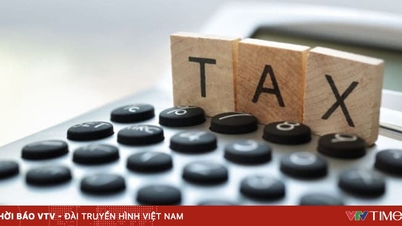
Many National Assembly deputies believe that taxing business households based on revenue after abolishing lump-sum tax is unreasonable, creating a burden for small businesses - Photo: QUANG DINH
On November 5, the National Assembly discussed in groups the draft Law on Tax Administration (amended) and the Law on Personal Income Tax (amended). Many delegates said that the tax policy for business households and the family deduction level for personal income tax (PIT) as proposed by the Government are not suitable.
Taxation based on revenue, businesses suffer losses
The most notable point of the Tax Administration Law is the tax administration for business households, when the Government proposed to apply tax calculation based on a percentage of revenue after implementing the policy of abolishing lump-sum tax, which will be applied from January 1, 2026.
According to delegate Tran Van Lam ( Bac Ninh ), the amendment policy is reasonable, but if the above mechanism is applied, it will create a burden and be unfair, unreasonable, and disadvantageous for business households, especially small businesses - which are inherently vulnerable.
Because if comparing the percentage of revenue that business households must pay with enterprises and units that implement a full accounting regime, the tax payable/revenue rate of business households will be many times higher than that of this subject.
In reality, the profit/revenue of a normal business household is 3 - 5%, at best 10%, if the tax rate is 1 - 5%, that means "all the profit" of the business person is gone.
According to Mr. Lam, the regulation on the non-taxable revenue threshold of business households and individuals in the Personal Income Tax Law is also unreasonable. For business people, the revenue level of 200 million VND/year, equivalent to 16.6 million VND/month, the average profit is 10%, the actual income is only 1.6 million VND/month, and they have to pay tax.
Meanwhile, people with taxable income are from 10 to 11 million VND/month, so if such regulations are applied to business people, it will be unreasonable and disadvantageous when they have dependents and low profits.
Delegate Hoang Van Cuong (Hanoi) also said that it is necessary to clarify that income tax is income, not revenue. For example, a person sells 200 cartons of milk (revenue of 200 million VND), but the income may only be 10 million VND, and must pay tax immediately.
Meanwhile, a barber with a revenue of 200 million VND, expenses of only 50 million VND, and income of about 150 million VND is not subject to tax.
Therefore, according to Mr. Cuong, the regulation that income tax must be paid from a revenue of 200 million VND is unfair, and should be defined as actual income. "I propose that income tax for business people should be divided into groups of business sectors (wholesale services, sales of goods, regular services, manufacturing)," said delegate Cuong.
According to delegate Tran Thi Hien (Ninh Binh), it is necessary to carefully study the regulations, ensuring that they are consistent with the spirit of Resolution No. 68 and the goal of improving people's lives. Determine a transitional period specifically for business households and micro-enterprises, possibly within 1-2 years such as simple declaration, or tax authorities support declaration on their behalf with available data.
The family deduction must cover living expenses.
Meanwhile, the proposal to increase the family deduction level for individuals subject to personal income tax was also assessed by delegates as inappropriate. According to the proposal in the Government's report, the adjusted family deduction level for taxpayers is 15.5 million VND/month and 6.2 million VND/month for each dependent.
Delegate Nguyen Thi Le (HCMC) said that reality shows that the family deduction is no longer suitable for the living standards in big cities, especially HCMC - where the cost of living is high and the prices of goods and services are increasing rapidly. If the old deduction continues to be maintained, the majority of workers in the middle segment will clearly feel the tax burden and thus limit consumption.
Therefore, Ms. Le suggested that the draft should increase the family deduction level, and at the same time design a flexible mechanism so that the Government can periodically adjust according to the consumer price index (CPI), avoiding the situation where the law quickly becomes outdated.
In addition, it is necessary to add regulations allowing the Government to proactively submit to the National Assembly Standing Committee adjustments to deductions, tax exemptions, and tax rates in case of major price fluctuations or economic crises.
"This helps tax policy both ensure its regulatory role and timely support for the economy," Ms. Le emphasized. Delegate Nguyen Nhu So (Bac Ninh) also said that the deduction for dependents of 6.2 million VND is low compared to the current cost of living, when prices of essential goods, health care, education and nutrition costs are increasing sharply.
Therefore, Mr. So proposed adjusting the deduction for dependents to about 50% of the taxpayer's deduction, a truly humane tax policy, creating motivation to stabilize family life and strengthen the social security foundation.
According to delegate Ma Thi Thuy (Tuyen Quang), the family deduction level does not take into account factors such as whether the subject is in rural or urban areas, what level of education the child has, whether the subject has to take care of sick parents or not... In particular, the income of subjects in urban and rural areas is very different; the expenses of families with children in university are also much larger than those of families with young children.
Therefore, Ms. Thuy proposed that the family deduction level should be classified according to the spending level of the subjects: distinguish between urban and rural areas, family deduction at a higher level for those who have to raise children to go to university, support sick people, and people with disabilities. The goal is for people with taxable income to ensure enough to cover living expenses.
Need to carefully consider imposing taxes on gold
According to delegate Hoang Van Cuong (Hanoi), gold is an asset to be stored and saved, so taxing gold purchases and sales should be considered a solution to stabilize the gold market in the context of unusual fluctuations.
Therefore, Mr. Cuong proposed to give the Government the right to apply this tax policy to adjust when the market fluctuates abnormally, applying it in urgent periods (for example, 6 months or a few months), instead of applying this policy regularly.
Delegate Le Thi Thanh Lam (Can Tho) also said that the proposed 0.1% tax on each purchase transaction should be implemented with a clear distinction between speculative activities and hoarding issues so as not to affect people who buy gold just for the sake of saving.
"For a long time, transferring a portion of income to buy gold has been the mentality and habit of Vietnamese people. If you have money, save it to buy gold in case of need," said Ms. Lam, adding that the regulation of the taxable threshold for gold bar transfer value will only be effective when the policy is implemented with a clear and transparent roadmap.
According to Ms. Lam, it is necessary to build a flexible declaration and deduction mechanism, allowing gold trading organizations or future trading floors or commercial banks to carry out deductions and tax payment procedures on behalf of traders, helping to reduce the procedural burden for individuals.
At the same time, electronic tax declaration is also integrated through the national tax data system to synchronize information, improve monitoring capabilities, increase transparency and efficiency in policy implementation.
Delegate Tran Van Lam (Bac Ninh) also said that gold accumulated by people is gold saved for important things such as buying a house or building a house for children, but when sold, it is taxed, meaning that tax is being collected on people's savings, which is unreasonable.
Therefore, according to Mr. Lam, it is possible to tax gold but at a starting level, not just one tael of gold or one tael of gold. For example, the starting level of tax on gold can be equal to the value of a social housing apartment, or based on the life and living standards of the people, avoiding the situation where gold is subject to multiple taxes.
Source: https://tuoitre.vn/lo-ganh-nang-thue-cho-ho-kinh-doanh-20251105231439411.htm




![[Photo] Closing of the 14th Conference of the 13th Party Central Committee](https://vphoto.vietnam.vn/thumb/1200x675/vietnam/resource/IMAGE/2025/11/06/1762404919012_a1-bnd-5975-5183-jpg.webp)












































































































Comment (0)